
Aebi Schmidt Group successfully signs a syndicated loan for 600 million US dollars
CH-Frauenfeld, March 11, 2025 – Aebi Schmidt Group is pleased to announce the successful closing of a USD 600 million syndicated loan agreement. The financing was arranged by UBS Switzerland AG and Zürcher Kantonalbank and was significantly oversubscribed. The agreement is a milestone in the success of Aebi Schmidt Group's planned Nasdaq listing.

National Highways selects three-in-one winter resilience vehicles from Aebi Schmidt
National Highways, the government owned company charged with operating England's motorways and major A-Roads, have purchased 12 three-in-one winter resilience vehicles from Aebi Schmidt to future-proof its winter maintenance capabilities.

Powering Through the Dolomites – Efficiency and Safety in Extreme Terrain
The Dolomites – breathtaking yet demanding. Those who work here know that reliable technology is essential. Marco Martini is all too familiar with the challenges of mountain farming. Steep slopes, unpredictable weather, and heavy loads are part of his daily routine. But for him, that’s no problem –thanks to his Aebi TP 470 Vario. His story reveals why he chose this particular model and how it makes his work easier every day.
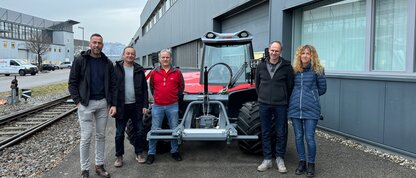
On the Trail of a Very Special Terratrac
At the Raffalthof farm in Terenten, South Tyrol, stands an Aebi TT 281+ with a unique story — the 15,000th Terratrac to leave our factory in Burgdorf. Recently, we had the pleasure of welcoming the owners of this milestone vehicle, Michael and Brigitte Schmid.

Optimised Schmidt FS HP snow cutter-blower
The Schmidt FS HP snow cutter-blower is already setting high standards in snow clearing. The optimisations to the FS HP ensure that the snow cutter-blower, together with other Schmidt winter maintenance solutions, remains at the forefront of snow clearing technology and now supports our customers even more efficiently in maintaining clear and safe roads during the winter months.

From Guesswork to Precision: How Sensor Technology Transforms Sweeping
Have you ever wondered how often a sweeper makes unnecessary trips to empty its hopper? How much time and resources are wasted in the process? The answer is: more often than necessary. But it doesn't have to be that way! With the innovative hopper level sensor from Aebi Schmidt, you can maintain full oversight and optimise your sweeping operations for the long term.

The New EL+ Enters the Pavement Marking Mix
The EL+ (pronounced E-L-Plus) is an exciting new member to MB Pavement Marking Equipment’s robust family of striping solutions. Much like the development of any new product, the EL+ was engineered and built with an eye toward production speed, simplified function, and (most importantly) meeting customer needs. The EL+ is a perfect fit for contractors and municipalities that want a standardized paint striping truck that gets the job done.
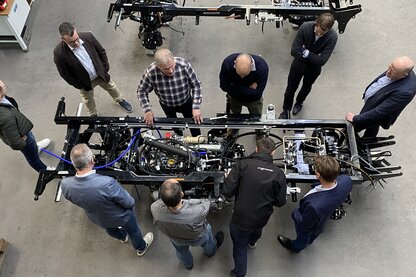
How to gain market share?
In the past financial year, the Aebi Schmidt Group’s turnover exceeded one billion euros for the first time in its history. In addition, we have gained market share, which is mainly triggered by the team performance of our individual local sales and service organisations. At the beginning of the year, the heads of the teams shared their experiences, including a visit at Ladog in Zell am Harmersbach (Germany), to see which products and solutions we can use to serve our customers even better in the future.
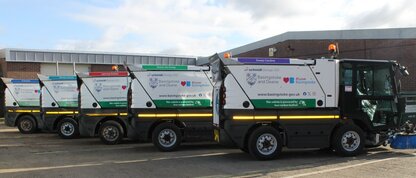
Basingstoke and Deane Borough Council tackles leaf fall with sustainably-fuelled Swingos
Basingstoke and Deane Borough Council, a borough in the South of England is tackling leaf fall this winter - the busiest time of the year - with a fleet of environmentally-friendly Swingo compact sweepers that run on HVO (hydrotreated vegetable oil) with emissions up to 98% lower than diesel.

Record year for the Aebi Schmidt Group: sales and profitability at an all-time high
CH-Frauenfeld, January 28, 2025 – The Aebi Schmidt Group closes the 2024 financial year with a record result. Sales increased by 7% compared to the previous year and reached the one billion euro mark for the first time, accompanied by a significant increase in market share. The EBIT margin grew overproportionally to 8.2%.

A Professional Fleet for a Demanding Client – Intertoll Polska and Aebi Schmidt Stand Guard over the A1 Motorway
Intertoll Polska, responsible for managing the northern section of the A1 motorway, has been establishing new benchmarks in road maintenance for over two decades. Its collaboration with Aebi Schmidt allows the company to deliver the highest operational standards, meeting the specific challenges of Poland’s road infrastructure.
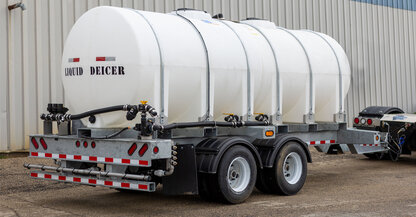
Liquid De-Icing: Why Spraying is Staying
Although snow and ice remain unchanged, significant advancements in technology have been made to keep roadways safe. For many years, “salt trucks” spread traditional rock salt and sand onto pavement surfaces to combat dangerous conditions. However, since the 1990s, many parts of the U.S. have transitioned to spraying liquid salt instead of simply spreading it. Why the switch? Learn why liquid brine deserves recognition as an effective ice-fighter.
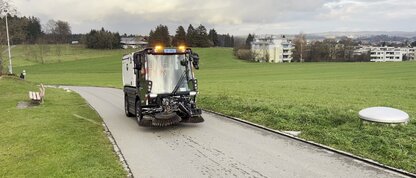
Quiet Innovation: Wallisellen on the Road to Electric Sweeping
Wallisellen, the youngest town in the canton of Zurich (CH), is known for its forward-thinking approach. With around 18,000 inhabitants and 50 kilometres of roads, plus an equal length of pavements, the town's maintenance team regularly faces significant challenges. Compact sweepers are indispensable tools for this work. However, when their tried-and-tested Schmidt Swingo 200+ diesel sweeper surpassed the 10,000-hour mark, the question arose: what’s next?
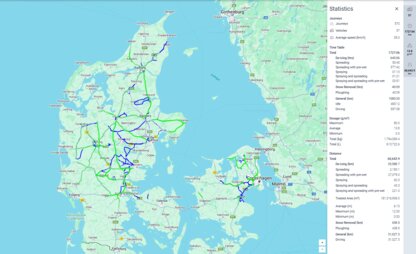
3000 reasons for IntelliOPS Winter Service
Sustainability is not just a buzzword, but a decisive factor for modern winter service solutions. With IntelliOPS Winter Service, our operations and fleet management system, the Aebi Schmidt Group demonstrates how innovative technology helps to safe resources while delivering the highest quality. Thanks to the use of our system, the Danish Vejdirektoratet has been able to significantly increase its efficiency: it is expected to save up to 3000 tonnes of salt per season.

Aebi Schmidt Group is now ISO 27001 certified
ISO 27001 is the internationally recognised standard for an information security management system that helps organisations to protect sensitive data and systematically manage risks in the handling of information. After almost a year of preparation, our group recently successfully passed the audit and is now ISO 27001 certified.

How do you establish an IT security management system?
Our Group was recently successfully audited and certified in accordance with ISO 27001. Read here in an interview with Dario Stöckli, CISO at the Aebi Schmidt Group and project manager for the ISO 27001 certification, about the challenges of such a project, success factors and what the future holds for the newly certified IT security management system.

Pioneering Digital Solutions in Winter Maintenance
In our previous blog, we highlighted our groundbreaking innovations in salt spreading over the last 75 years. Now, we turn our focus to the digital solutions transforming winter services. For 75 years, Aebi Schmidt Nederland—part of the Aebi Schmidt Group—has led the way in pioneering digital technologies that enhance efficiency, optimize resource use, and improve road safety. In this blog, we explore key digital advancements, including the evolution from WinterLogic to IntelliOPS, and the development of driver assistance systems like Route Assistant and ThermoLogic.

Aebi Schmidt Group to Merge with the U.S. company The Shyft Group and List in the U.S. on the NASDAQ Stock Market
CH-Frauenfeld, December 16, 2024 – Aebi Schmidt Group and The Shyft Group (NASDAQ: SHYF) today announced a definitive agreement to combine in an all-stock merger. Aebi Schmidt’s current shareholders will hold a majority in the combined company at closing. This merger will create a world leading specialty vehicle manufacturer and upfitter, with estimated 2024 combined revenue of nearly 2 billion U.S. dollars. After closing, Aebi Schmidt’s shares will trade in the U.S. on the NASDAQ Stock Market.

Electrifying Versatility: A Look Behind the Scenes of the Development of an Electric Sweeper
Safety in modern sweepers is a top priority, especially in electric models such as the Schmidt eCleango 550. From its robust cabin structure to ergonomic design and innovative glazing, numerous tests and certifications ensure that every component meets the highest standards. Discover how thoughtful engineering and rigorous testing result in a safe and user-friendly product.

More comfort, more efficiency: the new Aebi models
How do you make good things even better? By putting the user at the centre and making handling even easier in demanding applications with modern operating concepts, targeted performance enhancements and optimised technology.